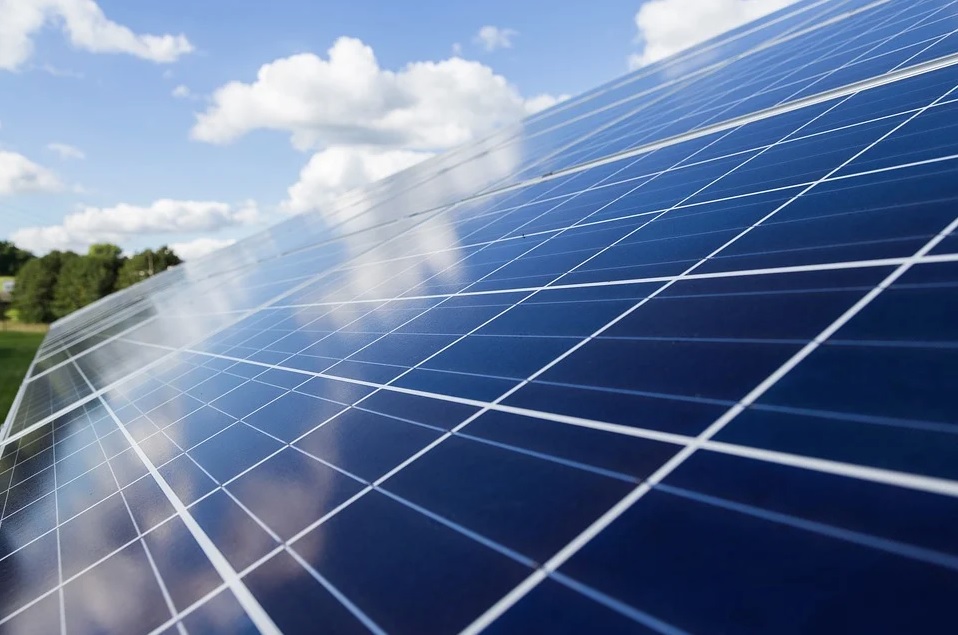International Summer School on Photovoltaic Systems and Emerging Technologies (From mainstream silicon to disruptive organics/perovskites technologies)
Θετικές Επιστήμες και Επιστήμες Μηχανικών
· Ανανεώσιμες Πηγές Ενέργειας
Επιστημονικός Υπεύθυνος: Ελένη Αποστολίδου
Τμήμα: Χημείας
Γνωστικό Αντικείμενο-Ειδικότητα:
Dr Eleni Apostolidou possesses a Diplôme d’ Etude Approfondies de Chimie Appliquée – Chimie Industrielle (DEA) from University Pierre et Marie Curie, Paris, and a PhD in Production of photovoltaic grade silicon from metallurgical grade silicon by a plasma purification process in Laboratoire de génie des procédés plasmas et traitement de surface from University Pierre et Marie Curie, Paris. She has been a faculty member of the International Hellenic University (IHU – formerly Eastern Macedonia and Thrace Institute of Technology) since 1992, holding the position of the Vice President. She is also Director of the Alternative Energy Resources and Heat transfer Laboratory of the Department of Chemistry (formerly Department of Petroleum, Natural Gas Technology & Mechanical Engineering) of IHU – Kavala Campus. Her research work concerns the fields of production of photovoltaic grade silicon from metallurgical grade silicon by a plasma purification process, physical and chemical characterization of photovoltaic material.
Τηλ: 2510462225
Email: elapost@chem.ihu.gr
Προπτυχιακοί, Μεταπτυχιακοί φοιτητές, υποψήφιου διδάκτορες
και όλες οι ειδικότητες μηχανικών.
Απαιτείται βιογραφικό σημείωμα από τον κάθε υποψήφιο κατά την
αίτηση.
Διάρκεια: 10 ημέρες (67 ώρες)
Κόστος
http://summerschool.teiemt.gr/index.php/application
Fees for attending the Programme run into:
- €450/person (early bird fee), payable until May 28, 2022.
- €500/person (normal fee), payable until June 28, 2022.
- €300/person (normal fee) for IHU students.
Payments will be completed in 2 instalments:
- 1 advance payment of €150.
- 1 payoff payment of €300 or €350 (early bird or normal fee respectively), depending on the payment deadline date.
Δια ζώσης Εκπαίδευση
Το πρόγραμμα πραγματοποιείται με φυσική παρουσία.
Μετά την ολοκλήρωση των μαθημάτων/διαλέξεων , τα άτομα που
το παρακολούθησαν παρουσιάζουν project.Τα θέματα τους έχει δοθεί στην αρχή.
Ο κάθε εκπαιδευτής προτείνει 3 θέματα από τα οποία και
διαλέγουν οι συμμετέχοντες στο θερινό σχολείο.
· Βεβαίωση παρακολούθησης (150 φόρτος εργασίας, 6 ECTS)
International Hellenic University – Kavala Campus
Agios Loukas, 65404, Kavala,Greece
Tel & Fax: +30 2510462225
Dr Eleni Apostolidou
Dr Eleni Apostolidou possesses a Diplôme d’ Etude Approfondies de Chimie Appliquée – Chimie Industrielle (DEA) from University Pierre et Marie Curie, Paris, and a PhD in Production of photovoltaic grade silicon from metallurgical grade silicon by a plasma purification process in Laboratoire de génie des procédés plasmas et traitement de surface from University Pierre et Marie Curie, Paris. She has been a faculty member of the International Hellenic University (IHU – formerly Eastern Macedonia and Thrace Institute of Technology) since 1992, holding the position of the Vice President. She is also Director of the Alternative Energy Resources and Heat transfer Laboratory of the Department of Chemistry (formerly Department of Petroleum, Natural Gas Technology & Mechanical Engineering) of IHU – Kavala Campus. Her research work concerns the fields of production of photovoltaic grade silicon from metallurgical grade silicon by a plasma purification process, physical and chemical characterization of photovoltaic material.
Dr Malek Benmansour
Dr Malek Benmansour is currently the head of the Laboratory of Materials and Processes for Photovoltaics at the French Alternative Energies and Atomic Energy Commission (CEA – INES). He completed his MSc studies at the Pierre and Marie Curie University and working for his PhD thesis at the Laboratory of plasma processes at the French National School of chemistry. His research interests and expertise are development of processes for metallurgical silicon refininxg and silicon processes for photovoltaic applications.
Dr Stéphane Cros
PhD in physico-chemistry in 2002 from the University Paris VI, working on multilayer structures based on nanocomposite organic/inorganic materials. After a first experience in the field of polymer processing, he joined the CEA in 2004 to develop the thematic of encapsulation, barrier measurements and barrier materials in the OPV team. Since 2005, he is working in the Department of Technological Research within the French National Institute for Solar Energy (CEA/INES).
Dr Ing. Dhaker Abbes
Dr Ing. Dhaker Abbes was born in 1984. He obtained his Electrical Engineering diploma from the engineering school of Tunis (ENIT) in 2007, then a Master degree from the national engineering school of Poitiers, France (ENSIP) in 2008. He has a doctorate in Electrical Engineering since 2012, with a confirmed specialty in renewable energy, cleaner alternatives and optimization of complex energy systems. He is a researcher teacher and co-head of Energy, Electrical and Automated Systems (ESEA) field in the engineering school HEI Lille. He is also a member of electrical networks teams in the L2EP Laboratory.
Dr Ing. Dhaker Abbes conducted his thesis work at Laboratory of Computer Science and Automation for Systems of Poitiers (LIAS Poitiers) and in the General Engineering School of La Rochelle (EIGSI La Rochelle). He also worked in the European project E4R that concerns Portugal in addition to Spain and France.
Currently he is involved in several research projects such as HYBRIDSTOCKPV and CASTOR projects in partnership with project GBsolar and thesis projects of Xingyu Yan and Petronela Valeria Pankovits. He is author or co-author of around twenty scientific publications in journals and national and international conferences. He is also an invited tutor in ISEC Coimbra (Portugal) and the Polytechnic University of Bucharest (Romania).
Dr Nikolaos C. Kokkinos
Dr Nikolaos C. Kokkinos is an Associate Professor at the Department of Chemistry of the International Hellenic University – Kavala Campus (formerly Department of Petroleum, Natural Gas Technology & Mechanical Engineering of the Eastern Macedonia and Thrace Institute of Technology), Greece. Moreover, he is the Program Director of MSc in Oil and Gas Technology of the International Hellenic University – Kavala Campus. Dr Nikolaos Kokkinos serves as Section Officer of the SPE (Society of Petroleum Engineers) in Greece (Kavala Section) since 2013; he is in charge of Porous Media & Chemical Process Modelling and Simulations Laboratory at IHU – Kavala Campus; and he holds a researcher position in the Division of Petroleum Forensic Fingerprinting (PFF) at Hephaestus Advanced Research Laboratory (IHU – Kavala Campus). He has over ten year experience in the academia as a lecturer on both undergraduate and postgraduate programmes in O&G Engineering at various Universities and additional ten year experience in the O&G Industry as an engineering consultant. Dr Nikolaos Kokkinos collaborated with the Organic Geochemistry Unit (OGU) at University of Bristol (UK) as Post-Doctoral Research Associate; he holds a PhD in Petroleum Process Simulations, an MPhil in Applied Catalysis, an MSc in Information Technology and a BSc in Petroleum Engineering. He is editor and reviewer in various scientific journals in the field of energy engineering, applied catalysis, and scientific simulations. His research interests, among others, include M&S in process engineering, geochemistry and applied heterogenised homogeneous catalysis in complex substrates.
Dr Ioannis Tsanakas
Dr Ioannis Tsanakas is R&D Project Manager at CEA-INES (France), in charge of projects on performance/reliability, O&M and sustainability of PV applications and systems. He holds a PhD in Management and Production Engineering (2013) and MSc in Electrical and Computer Engineering (2006). Awarded by the EU in 2017, among Europe’s 30 exemplary researchers. Prior to CEA, he also worked as PV Research Engineer in Belgium (imec/EnergyVille), Norway (IFE) and France (CNRS).
In parallel, Ioannis is actively involved as PV expert, in international collaborative platforms for the PV research and industry (International Energy Agency (IEA) PVPS programme, European Technology & Innovation Platform (ETIP PV), Solar Power Europe O&M, EU-JRC Ecodesign). Over the last 13 years, he has been involved in >20 national and international R&D projects (~29 M€), with a scientific production of 1 international patent and more than 55 publications, talks or technical reports in the field.
Dr. Theodoros Damartzis
Dr. Theodoros Damartzis holds a diploma in Chemical Engineering from the Aristotle University of Thessaloniki (AUTh), Greece and a PhD from the department of Mechanical Engineering from the same institute. Since 2008, he has worked as a research associate at the Chemical Process and Energy Resources Institute (CPERI) at the Centre for Research and Technology Hellas (CERTH) and as a post-doctoral researcher at the École Polytechnique Fédérale de Lausannne (EPFL) in Switzerland. In 2022 he has been elected Assistant Professor at the department of Chemical Engineering of AUTh.
His research involves (a) the design of sustainable energy systems focused on renewable energy resources, (b) the technoeconomic and environmental assessment of processes and energy systems including the development of flowsheets and determination of the appropriate economic and environmental policy, (c) modeling, optimization, integrated design and control of thermochemical and biochemical conversion processes for and multi-phase reactive separation systems.He is the author of 22 scientific papers in peer-reviewed journals as well as 3 book chapters and has served as guest editor in 4 open access special issues.
Dr. George Skevis
Dr George Skevis is a Principal Researcher at the Chemical Process and Energy Resources Institute of the Centre for Research and Technology Hellas (CERTH) where he is leading a Research Group on Carbon Circular Economy. He holds a Bachelor’s Degree (BEng, First Class Honors) in Mechanical Engineering from Imperial College London, a Masters Degree in Mechanical Engineering from Stanford University and a Ph.D. in combustion chemistry from Imperial College London. He is a Visiting Professor in the Agricultural University of Athens and the International Hellenic University. His expertise lies in the science and technology of conventional and alternative fuels combustion and the mitigation of its adverse environmental effects, including carbon capture utilization and storage, and the modelling and simulation of energy processes. Dr Skevis has more than 130 publications in archive journals and international conference proceedings and a long experience in managing multinational R&D projects as well as providing consulting services to the industrial, transportation and agricultural sectors. He is the Vice-Chair of the EU SMARTCATS and WIRE Networks, the Coordinator of the Greek Pilot Centre of the ERCOFTAC (European Research Community on Flow, Turbulence and Combustion) and serves in the Board of the Federation of the European Sections of the Combustion Institute.
Technical Staff
George Vythoulkas
George Vythoulkas studied Mechanical Engineering in Kavala. He worked for 12 years in a marmor company as supervisor of production department and since 2002 has joined the School of Science of the International Hellenic University – Kavala Campus (formerly School of Technological Engineering of the Eastern Macedonia and Thrace Institute of Technology) as laboratory assistant in courses as for example heat transfer and renewable energy recourses, doing experiments, such as heat flow, solar radiation, wind turbine generators, using weather data observations from the laboratory’s “Vaisala” weather station. Lately, we have expanded our capabilities by adding new devices in our laboratory, such as a thermographic camera “Fluir E300” and a “Hydrogenius” Fuel Cell unit from Hyliocentris.
Τίτλος Διδακτικής/Θεματικής Ενότητας | Τίτλος υποενότητας | Ώρες | Διδάσκων/Διδάσκουσα |
Energy Reserves and resources World O&G reserves and resources PRMS Energy consumption GHG emission Renewable energy technologies | 1,5 | N. Kokkinos | |
Renewable Energy, Resources and Perspectives
| Energy resources and global situation Renewables potential Energy efficiency Greenhouse gas emissions Economics of renewable technologies Technological pathways for renewable energy technologies Perspectives of renewables introduction in the energy system Carbon flows and circularity Energy system design | 1,5 | Th. Damartzis |
Photovoltaic Technologies (PVT)
| Part 1 PV principles Crystalline silicon based technology, Types and conversion efficiency of different solar cells architecture Part 2 LCC of some PV installations Principle of LCC calculation Trends and issues: What’s Future? | 3 | M. Benmansour |
Organic & Perovksites Photovoltaics (OPV & PPV)
| 1. Analysis of scientific papers describing specific topics related to OPV or PPV. These “Highlight” papers will selected by groups of students and orally presented. | 10 | S. Cross |
Photovoltaic System Applications (PVS)
| Part 1: PV systems applications An overview of applications Stand-alone systems: Components and conversion chain MPPT System design Grid-tied systems: Integration of PV generators to the grid Conversion chain Power converters associated to grid-tied PV systems Regulations and policies Grid services Hybridization of electrical energy storage for intelligent integration of PV in electric networks Part 2: Simulation of a case study | 9 | D. Abess |
Modeling and Simulation in Energy Engineering (MSEE)
| Fundamentals of Energy Systems Design (Mass and energy balances, Energy efficiency, Environmental assessment). Introduction to Modelling and Simulation (Multiscale physics-based models, Performance-based models, System integration). Energy Performance and Financial Feasibility of PV Systems (Energy model, Cost analysis, GHG analysis, Financial analysis) Thermal Performance of PV Panels (Problem formulation, Geometry modelling, Meshing, Boundary and initial conditions, Physical models and input parameters, Run simulation, Post-process results) Hands-on computations using the ANSYS Student and RETScreen software platforms. | 8 | G. Skevis |
Scientific Writing in Energy Engineering | In the communication of energy science, however, scientific writing potentially presents a weak link. Here, we address this problem by clarifying the principle conventions for writing articles in energy science. We propose a top-down approach to writing that begins with structuring the article into sections. Each section should, in turn, be structured in and of itself so that readers can: (i) comprehend the scientific context; (ii) grasp the research questions addressed; (iii) verify methods and results; and (iv) understand the significance of the results. Subsequently, authors should ensure clarity of their scientific arguments by: (i) presenting existing information at the beginning of a sentence and new infor-mation at the sentence’s end; (ii) articulating action with appropriate verbs, preferably in active voice; (iii) placing statements in positive form; and (iv) using consistent technical terminology. | 6 | N. Kokkinos |
Photovoltaic Systems: Performance, Reliability and Emerging Challenges in O&M
| Part 1 Introduction – Basic elements O&M and Performance of PV systems Performance indicators Monitoring and Forecasting Safety considerations O&M and Reliability of PV systems Losses and Failure Mechanisms Maintenance actions and strategies Characterization, diagnostic and inspection methods Emerging Challenges Towards sustainability: PV in the Circular Economy era Towards digitalization: PV in the Industry 4.0 era | 8 | I. ε I. Tanakas |
Case Studies and Techno-Economic Analysis of Photovoltaic Systems (CSTE)
| Part 1 Power plant design Load address Solar plant sizing Battery storage Cost estimation Part 2 Guide for authors Preparation of an article Preparation of a presentation Reference Management Software Reviewing | 8 | D. Abess |
Hands on experience on silicon VS Organic PV | Determination of electrical characteristics of 1st, 2nd and 3rd generation photovoltaics. Comparison of results | 8 | E.Apostolidou / G. Vithoulkas |
Students Presentation / Assessment | Participants present the tasks assigned to them | 4 | E. Apostolidou/N.Kokkinos/M.Benmansour |
The Programme is organized by the International Hellenic University (IHU) – Kavala Campus, CEA laboratories in INES (French national solar institute), and HEI – Grand Ecole d’ Ingenieur Generaliste, Universitè Catholique de Lille. The Programme is also aided by IHU – Kavala Campus Erasmus+ Office and is held in the facilities of the International Hellenic University in Kavala, Greece.





